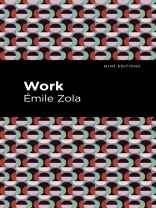Work (1901) is a novel by French author Émile Zola. Published as the second installment of his Les Quatre Évangiles, a series of four novels inspired by the New Testament gospels and aimed at investigating prominent social issues, Work was the last of Zola’s novels to be published during his lifetime. Combining his trademark naturalist style with an interest in Charles Fourier’s theory of socialist utopianism, Zola crafts a story of hardship and perseverance without losing sight of humanity. Luc Fremont, an engineer, travels to a town at the heart of an important French industrial region. While staying in Beaumont, he is struck by the widespread poverty suffered by the working class, the very people whose expertise and labor is essential to the economic health of the nation. Calling upon an old friend, who owns a local steelworks, Luc enters into a deal in order to manage the production of La Crêcherie under an experimental cooperative model. With his determination and the hard work of the people, Luc establishes the steelworks as a functioning independent city-state, known for its profit-sharing, free housing, and focus on the lives of its workers and their families. As news of their success begins to spread, similar experiments take place across France and the globe, harnessing the transformative power of industry for the sake of people, not profit. This edition of Émile Zola’s Work is a classic work of French literature reimagined for modern readers.
Since our inception in 2020, Mint Editions has kept sustainability and innovation at the forefront of our mission. Each and every Mint Edition title gets a fresh, professionally typeset manuscript and a dazzling new cover, all while maintaining the integrity of the original book.
With thousands of titles in our collection, we aim to spotlight diverse public domain works to help them find modern audiences. Mint Editions celebrates a breadth of literary works, curated from both canonical and overlooked classics from writers around the globe.
Об авторе
Émile Zola (1840-1902) was a French novelist, journalist, and playwright. Born in Paris to a French mother and Italian father, Zola was raised in Aix-en-Provence. At 18, Zola moved back to Paris, where he befriended Paul Cézanne and began his writing career. During this early period, Zola worked as a clerk for a publisher while writing literary and art reviews as well as political journalism for local newspapers. Following the success of his novel Thérèse Raquin (1867), Zola began a series of twenty novels known as Les Rougon-Macquart, a sprawling collection following the fates of a single family living under the Second Empire of Napoleon III. Zola’s work earned him a reputation as a leading figure in literary naturalism, a style noted for its rejection of Romanticism in favor of detachment, rationalism, and social commentary. Following the infamous Dreyfus affair of 1894, in which a French-Jewish artillery officer was falsely convicted of spying for the German Embassy, Zola wrote a scathing open letter to French President Félix Faure accusing the government and military of antisemitism and obstruction of justice. Having sacrificed his reputation as a writer and intellectual, Zola helped reverse public opinion on the affair, placing pressure on the government that led to Dreyfus’ full exoneration in 1906. Nominated for the Nobel Prize in Literature in 1901 and 1902, Zola is considered one of the most influential and talented writers in French history.












